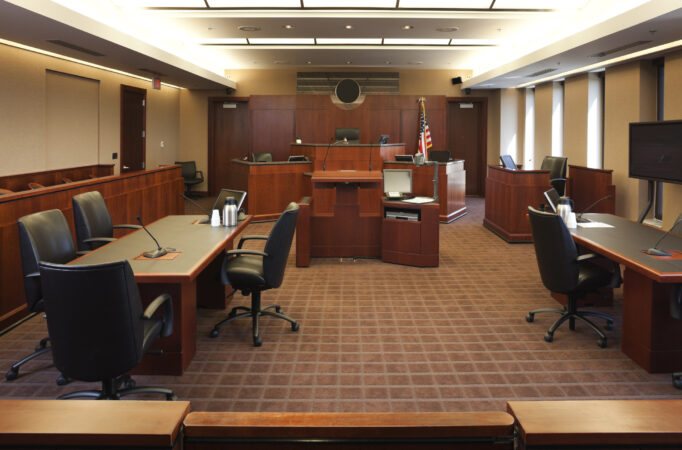Litigation: Latest Legal Blogs and News
AI As Lawyer? Contracts Prepared By Artificial Intelligence (AI) May Cause More Problems Than They Solve
Will AI enter the courtroom or replace lawyers in legal document drafting? This question is frequently being asked these days. While artificial intelligence offers an interesting new frontier for life in the 21st century, relying on artificial intelligence to prepare contracts can be problematic. In a June 2, 2023 interview on CNBC’s Squawk Box program, a guest discussing artificial intelligence confidently stated that the legal field is in “big trouble” because companies are already using artificial intelligence to generate complex contracts instead of having attorneys draft those documents. While it is true that artificial intelligence will impact the legal field, relying on artificial intelligence to prepare contracts is likely a recipe for trouble.
Contracts are the means by which individuals and businesses organize their economic activities with one another. See, Richard A. Posner,The Law and Economics of Contract Interpretation, 83 Tex. L. Rev. 1581, 1587 (2005).
The main purpose of contracts is to enable performance to unfold over time without either party being at the mercy of the other, as would be the case if, for example, a buyer could refuse to pay for a custom-built house for which there were no alternative buyers at or above the agreed price. So contracts regulate the future, and interpretive problems are bound to arise simply because the future is unpredictable. Stated otherwise, perfect foresight is infinitely costly, so that, as the economic literature on contract interpretation emphasizes, the costs of foreseeing and providing for every possible contingency that may affect the costs of performance to either party over the life of the contract are prohibitive.
Id. at 1582. While predicting the future is difficult, it is important to put time and effort into the preparation of contracts that may last for years and which have significant financial impacts. Houston Harbaugh’s litigation attorneys frequently represent clients in contract disputes that involve disagreement about what contract terms mean, contracts that are unclear, vague or contradictory or, sometimes, disputes involving contracts are unclear, vague and contradictory and the parties disagree with their meaning. Many of these issues result from clients who did not wish to hire a lawyer on the front end to draft a contract or who “pulled something from the internet and shaped it into what we wanted.” This is the classic scenario for later misinterpretation by one or both parties and the defenses raised against enforcement like vagueness, mistake and the claimed need for parol evidence.
Contrary to the CNBC guest’s suggestion that artificial intelligence drafting contracts will negatively impact attorneys, just the opposite seems true and both individuals and businesses should be aware of the limits of artificial intelligence and the dangers of relying on artificial intelligence to prepare contracts. While artificial intelligence is rapidly advancing, it presently has serious issues with “hallucinations”, where the program invents things that do not exist. Recent news stories confirm that relying on artificial intelligence for legal brief writing has problems, such as citing to nonexistent cases.
The impacts of teething issues like these are often downplayed in favor of a belief in technology that promises to solve all problems more cheaply, efficiently and easily than the past. That is where the danger lurks for individuals or businesses relying on artificial intelligence for things like complex contracts. There is no promise or guarantee that artificial intelligence will prepare better contracts than have existed in the past. And, worse yet, trusting and relying on artificial intelligence alone to prepare contracts may result in individuals having even less knowledge about what is in their contract. So, instead of artificial intelligence greasing the skids of commerce and eliminating the time and expense of hiring attorneys to prepare contracts, contracts drafted by artificial intelligence may result in even more contract litigation. Houston Harbaugh’s attorneys can assist on both fronts.
Preparing contracts involves more than inputting prompts into computer programs. It fundamentally involves counseling and guidance so that clients have a thorough understanding of what is in the contract and how the provisions operate in the real world. The parties must clearly express at minimum, offer, acceptance, expectations and remedies and the failure to do so clearly is generally a recipe for later litigation disputes. Whether AI can capture those essential elements and nuances is doubtful. How will parol evidence be generated if it is needed to combat a charge of vagueness? Houston Harbaugh’s business attorneys assist clients with contact drafting and enforcement on a daily basis. If you have a contract that is in dispute, Houston Harbaugh’s litigation attorneys can assist you with protecting your rights and resolving your dispute, whether through negotiations, private dispute resolution, or in court. artificial intelligence | contracts | lawyers | attorneys
If you need assistance with any part of a contract, whether the drafting, execution or enforcement, Houston Harbaugh can assist you. Contact the author at 412-288-2226.
About Us
The litigation attorneys at Houston Harbaugh, P.C., are accomplished business trial lawyers, providing comprehensive support in litigation across a broad spectrum of matters throughout Pennsylvania, West Virginia, Ohio and other jurisdictions upon a special admission basis. Our clients are regional and national small, medium and large companies and individuals who seek well planned and aggressive, but cost effective litigation. We counsel, we budget, we have a deep bench, we act quickly when needed and we have experienced trial lawyers who know the courts and bench. We serve regularly as local counsel for some of the largest law firms in the country when they have matters in this region.

Henry M. Sneath - Practice Chair
Co-Chair of Houston Harbaugh’s Litigation Practice, and Chair of its Intellectual Property Practice, Henry Sneath is a trial attorney, mediator, arbitrator and Federal Court Approved Mediation Neutral and Special Master with 98 trial verdicts and extensive federal and state court trial experience in cases involving commercial disputes, breach of contract litigation, Artificial Intelligence (AI), intellectual property matters, patent, trademark and copyright infringement, trade secret misappropriation, DTSA claims, cyber security and data breach prevention, mitigation and litigation, employment and restrictive covenant litigation, probate trusts and estates litigation, construction claims, eminent domain, professional negligence lawsuits, pharmaceutical, products liability and catastrophic injury litigation, insurance coverage, and insurance bad faith claims. DTSALaw® Business Litigation. Pittsburgh Strong.®

Samuel H. Simon - Practice Chair
As co-chair of Houston Harbaugh’s Litigation Group, Sam focuses his practice on commercial/business litigation. Sam regularly represents clients in the construction, manufacturing, oil and gas, and wholesale/retail/ distribution industries, as well as individuals in matters such as:
- Construction litigation
- Environmental litigation
- Breach of contract disputes
- Oil and gas litigation
- Negligence
- Restrictive covenants (non-compete agreements)
- Civil rights
- Collections/creditors’ rights
- Lease disputes

